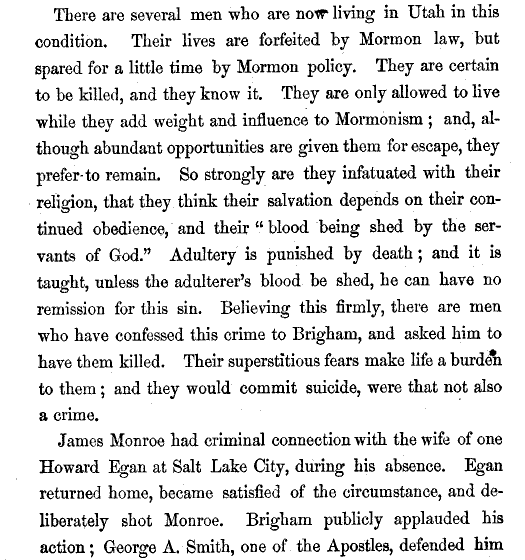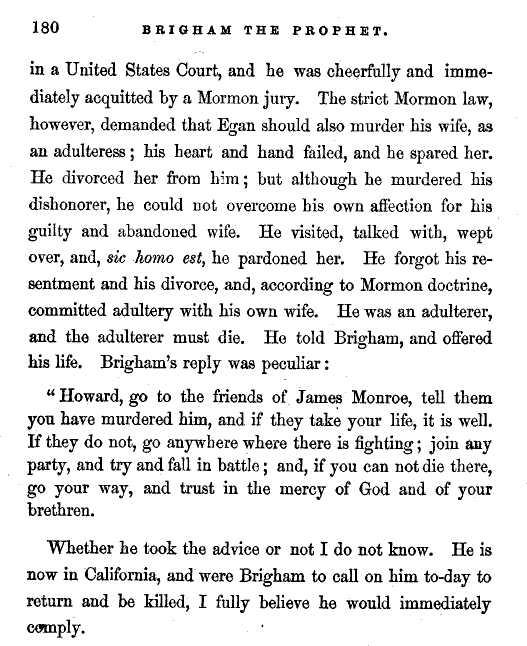John Hyde asserts that Howard Egan killed James Monroe for adultery, but then Howard Egan failed to have himself Blood Atoned for adultery with his own wife.
- Type
- Book
- Source
- John Hyde ExcommunicatedCritic
- Hearsay
- UnsourcedSecondary
- Reference
John Hyde, Mormonism Its Leaders and Designs (New York: W.P. Fetridge & Company, 1857), 179-180.
- Scribe/Publisher
- W. P. Fetridge & Co.
- Audience
- General Public
- Transcription
There are several men who are not living in Utah in this condition. Their lives are forfeited by Mormon law, but spared for a little time by Mormon policy. They are certain to be killed, and they know it. They are only allowed to live while they add weight and influence to Mormonism; and, although abundant opportunities are given them for escape, they prefer-to remain. So strongly are they infatuated with their religion, that they think their salvation depends on their continued obedience, and their "blood being shed by the servants of God." Adultery is punished by death; and it is taught, unless the adulterer's blood be shed, he can have no remission for this sin. Believing this firmly, there are men who have confessed this crime to Brigham, and asked him to have them killed. Their superstitious fears make life a burden to them; and they would commit suicide, were that not also a crime.
James Monroe had criminal connection with the wife of one Howard Egan at Salt Lake City, during his absence. Egan returned home, became satisfied of the circumstance, and deliberately shot Monroe. Brigham publicly applauded his action; George A. Smith, one of the Apostles, defended him in a United States Court, and he was cheerfully and immediately acquitted by a Mormon jury. The strict Mormon law, however, demanded that Egan should also murder his wife, as an adulteress; his heart and hand failed, and he spared her. He divorced her from him; but although he murdered his dishonorer, he could not overcome his own affection for his guilty and abandoned wife. He visited, talked with, wept over, and, sic homo est, he pardoned her. He forgot his resentment and his divorce, and, according to Mormon doctrine, committed adultery with his own wife. He was an adulterer, and the adulterer must die. He told Brigham, and offered his life. Brigham's reply was peculiar:
"Howard, go to the friends of James Monroe, tell them you have murdered him, and if they take your life, it is well. If they do not, go anywhere where there is fighting; join any party, and try and fall in battle; and, if you can not die there, go your way, and trust in the mercy of God and of your brethren.
Whether he took the advice or not I do not know. He is now in California, and were Brigham to call on him to-day to return and be killed, I fully believe he would immediately comply.
- Citations in Mormonr Qnas
The B. H. Roberts Foundation is not owned by, operated by, or affiliated with the Church of Jesus Christ of Latter-day Saints.


